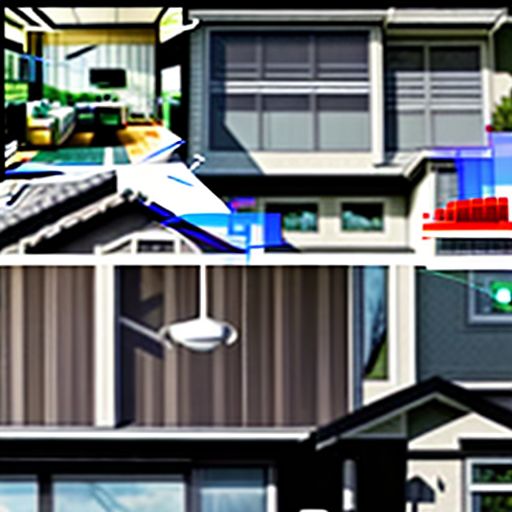Imagine this: you’re returning from a relaxing vacation, only to be greeted by a chilling sight – your front door ajar, lights flickering ominously inside. It’s a nightmare scenario no one wants to face, yet home intrusions are an unfortunate reality. That’s where home security alarm systems step in, acting as your vigilant guardian, 24/7.
Understanding Home Security Alarm Systems
Before we delve into the intricacies, let’s clarify what we mean by Security Home Alarm Systems. These systems are a network of interconnected devices working in harmony to detect and deter potential threats to your property and loved ones. Think of them as your personalized security detail, always on alert.
Why are Home Security Alarm Systems So Important?
The importance of home security systems extends far beyond just deterring burglars. Here’s why they’re a worthwhile investment:
- Deterrence: The mere presence of a visible security system can be enough to make a burglar think twice about targeting your home.
- Peace of Mind: Whether you’re home or away, a security system offers invaluable peace of mind, knowing your haven is protected.
- Faster Emergency Response: In the event of a break-in, fire, or other emergency, an alarm system can automatically contact the appropriate authorities, potentially saving precious time and lives.
- Reduced Insurance Premiums: Many insurance providers offer discounts on homeowners’ or renters’ insurance for homes equipped with security systems.
security.yougaming.xyz/wp-content/uploads/2024/07/home security system components-669233.jpg" alt="Home Security System Components" width="512" height="512">Home Security System Components
Breaking Down the Components
Home security alarm systems come in various configurations, but most comprise these core components:
1. Control Panel: The Brain of the Operation
The control panel is the command center of your system. It receives signals from all other components, processes them, and triggers the appropriate actions, like sounding the alarm or sending an alert to your smartphone.
2. Sensors: The Eyes and Ears of Your System
Sensors are strategically placed on doors, windows, and other potential entry points. They detect unauthorized openings, movement, or glass breaks, instantly sending signals to the control panel.
3. Motion Detectors: Catching Unwanted Visitors in Their Tracks
Motion detectors use infrared technology or other means to detect movement within a specified area. They’re particularly useful for monitoring larger spaces and can be programmed to differentiate between pets and intruders.
4. Security Cameras: Keeping a Watchful Eye
Security cameras, a vital part of many modern systems, provide visual verification of what’s happening in and around your property. They can be monitored remotely through smartphone apps, often with features like two-way audio and night vision.
5. Alarms: Sounding the Siren
The alarm itself is the most recognizable aspect of a security system. It emits a loud, high-pitched sound to deter intruders and alert neighbors of a potential threat.
Choosing the Right Home Security System for You
Navigating the world of home security systems can feel overwhelming, but it doesn’t have to be. Here are some key factors to consider:
- Wired vs. Wireless Systems: Wired systems offer greater reliability but require professional installation. Wireless systems, on the other hand, are easier to install and offer greater flexibility.
- Monitoring Options: You can opt for self-monitoring, where you receive alerts directly, or professional monitoring, where a security company responds to triggers and contacts authorities if needed.
- Smart Home Integration: Many modern systems integrate seamlessly with other smart home devices, allowing you to control lighting, locks, and thermostats from a central platform.
- Budget: Home security systems range in price, so determine your budget and explore options that fit your financial comfort zone.
Frequently Asked Questions About Home Security Alarm Systems
Q: How much does a home security alarm system cost?
A: Costs vary widely depending on factors like the system type, features, installation, and monitoring fees. Basic DIY systems can start as low as a few hundred dollars, while professionally installed and monitored systems can cost several thousand.
Q: Can I install a home security system myself?
A: Yes, many wireless systems are designed for easy DIY installation. However, if you’re not comfortable working with electrical systems or drilling into walls, it’s best to consult a professional.
Q: What happens if my alarm goes off accidentally?
A: Most monitoring companies have protocols in place to verify alarms before contacting authorities. You’ll typically receive a phone call or text message, and you’ll need to provide a password or answer security questions to confirm it was a false alarm.
Conclusion
Investing in a security home alarm system is a decision that shouldn’t be taken lightly. By carefully considering your needs, researching reputable providers, and choosing a system that aligns with your budget and lifestyle, you can gain invaluable peace of mind knowing your haven is protected.
What are your thoughts on home security? Share your experiences or any questions you might have in the comments below. Let’s start a conversation about keeping our homes and loved ones safe.
